
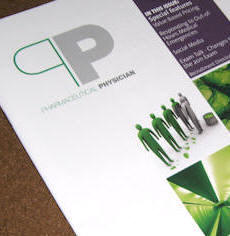
Hugh
Gibbons' references and recommended reading
PPhunnybone for
January
2012
for pharmaceutical physicians, colleagues and friends
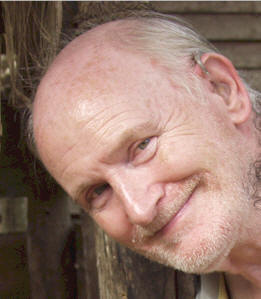
 |
||
|
|
Hugh
Gibbons' references and recommended reading
|
|
|
PPhunnybonus Home |
PPhunnybones References |
PPhunnies at Work |
PPhood
for Thought |
PPhurther Education: Dip.App.Gelotology |
PPhunnybonus Contact |
|
| ||

|
Click here for the full article (below)
| |
 |
Update! You have to laugh. David Cameron is said to have
used the Ig Nobel Medicine Prize bladder technique mentioned in
PPhunnybone - Click here for the article in The Guardian on 12 December * next meeting may be in the town of Loos | |
|
| ||
  |
Professor Robert Provine
|
|
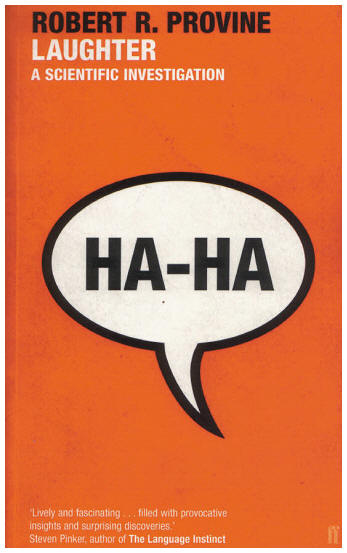 |
This paperback edition of his delightful book Laughter: a Scientific Investigation has the ISBN 0-571-19189-4 At Amazon and elsewhere you'll find a choice of versions available. On the right, you can see Bob Provine in action giving an excellent lecture called Cracking the Laughing Code at the Chicago Humanities Festival in 2009. It's also available on YouTube. The lecture is about 50 minutes long, and includes quite a lot of video clips and audience interaction - and an exemplar of good lecturing practice. Go to www.chicagohumanities.org/Genres/Science-And-Technology/2009-Robert-Provine-Laughing-Code.aspx
|
|
|
|
||
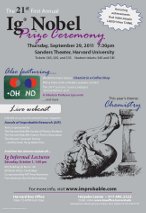 |
Ig Nobel Prizes - and the Annals of Improbable Research The starting point for
both is the website
www.improbable.com/ig The Ig Nobel Prizes honour achievements that make people laugh, and then make them think. The winners come to a gala ceremony at Harvard University's Sanders Theatre, and then give public lectures at MIT. The Awards always include full references Improbable Research is "a vast, happy, open conspiracy of many volunteers (scientists, journalists, teachers, students, and all sorts of other people) in many countries." The editorial board consists of fifty-odd eminent scientists, doctors, etc. from around the world, including several Nobel Prize winners and a convicted felon. The bookstore has some
good reads, of course. You'll also find a link to Luxuriant Hair Clubs for Scientists.
|
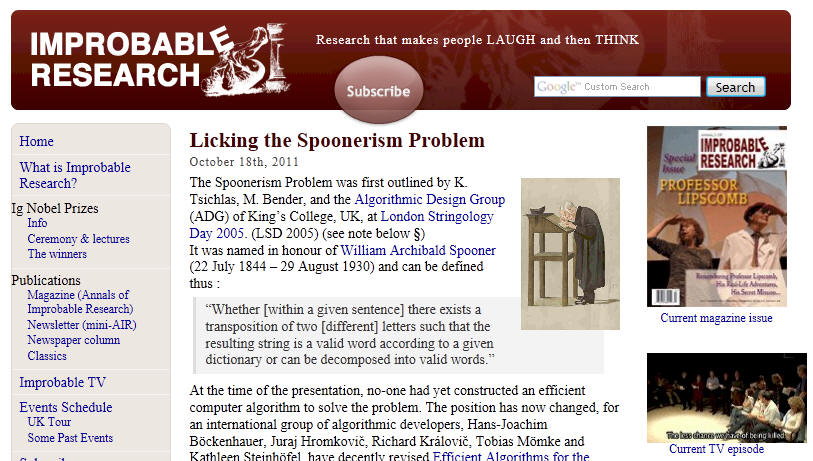
For information on events in 2012 -
including Ig Nobel tours of the UK and the Netherlands, go to www.improbable.com/improbable-research-shows/complete-schedule
|
|
|
||
 |
The Best of Miss Sweetie
Poo on YouTube They respond in a variety of ways, including bribes and kidnapping. Allow time to mop up the coffee you'll spill with laughter while watching. YouTube has some other clips of Ig Nobel winners.
|
 |
|
|
||
|
|
Extra idea: Rosemary Jarski for a right good laugh If you're looking for one-liners or short phunnies for a lecture or article, my own favourite bedtime reads are the compilations of Rosemary Jarski. These industrial-strength paperbacks are packed with freshfaced and our-times quotes, stiletto asides and other short bites to make a cat laugh. They also make great bedtime or flight-time reading - a few pages and then zzzzzzzzzzz. Just Google and see a big selection - or go into a bookshop and browse.
|
|
|
|
||
|
|
The best medicine: Miss Sweetie Poo? Be thankful for colleagues who can see a funny side to things. I’d have cheerfully done GBH on morose old Morse within a week; Norman Stanley Fletcher, never. Laughter is the shortest distance between people, said Victor Borge with his VGSOH in music and other matters. And it’s a valued therapeutic intervention, low on cost, high on QALYs - said to boost the immune system, trigger endorphin, protect the heart, and give abdominal, respiratory and facial muscles a workout. There’s now a British National Formulary of laughter - the amazing Comedy Carpet next to Blackpool Tower, a treat for the whole family. Chiselled on the slabs you’ll find the words of 850 writers and comedians, such as: “The Heehaahoohaa tribe is so called because they run through long grass without underpants.” Mind you, I’m sceptical about that name. Research has shown that, when people laugh, they opt for heehees or hoohoos, but don’t mix them. You’ll find evidence in the definitive book Ha-Ha: The Scientific Study of Laughter by Professor Robert Provine, an amiable neuroscientist at the University of Maryland. Researching the sound of laughter forced a lesson in lateral thinking. At first, Bob’s students sat people in a lab and told them jokes. Yes; well. So they tried a different clinical approach. Armed with audio recorders, they went up to people in the street and said, “I’m studying laughter. Will you laugh for me?” Instant response and reams of R&D data. They also researched conversations. Speakers tend to laugh more than listeners. Men create more laughter, but women laugh more. People will laugh at anything and with anyone - jokes aren’t necessary (pass the word, please). Laughter is also a great help in educating. Each September, the Ig Nobel Prize Ceremony honours “achievements that first make people laugh, and then make them think.” John Keogh won for “A Circular Transportation Facilitation Device” when he patented The Wheel to draw attention to flaws in the Australian registration system. The Prizes are awarded by Nobel winners, celebrate the unusual and imaginative, and spur interest in science, medicine, and technology. Robert Mathews won for his work on the mathematics of Murphy’s Law, recruiting 1200 UK schoolchildren in a science-class study on whether dropped toast really falls on its buttered side. Entries make fancy-tickling reads. You may have seen one in a 2006 BritMedJ: Sword-Swallowing and Its Side effects. The 2011 Medicine Prize went to researchers demonstrating that people make better decisions about some kinds of things when they have a strong urge to urinate. (So it’s not just fingers that executives need to cross…) The Ceremony ends: "If you didn't win a prize — and especially if you did — better luck next year!"
And it showcases a concept that’d be a humane
intervention at many a meeting endured by PPs. Winners have 30 seconds
to deliver their acceptance speech. After that, little Miss Sweetie Poo
arrives, remorselessly entreating: “Please stop, I’m bored. Please
stop, I’m bored. Please stop, I’m BORED…”
|
 A starting point for info on the great Victor Borge is at http://en.wikipedia.org/wiki/Victor_Borge YouTube has many clips of his performances
For full information on Wikipedia will also lead you to
|
|
For more information at any time,
contact E-mail: hughgibbons@just1.org.uk
|
||